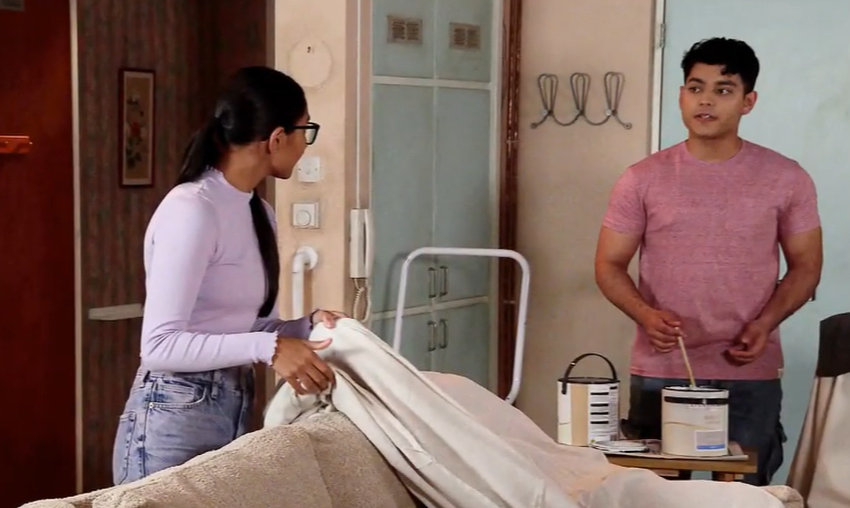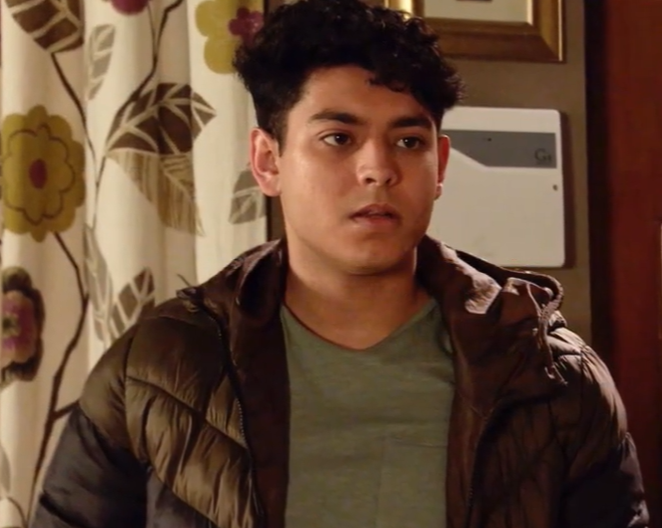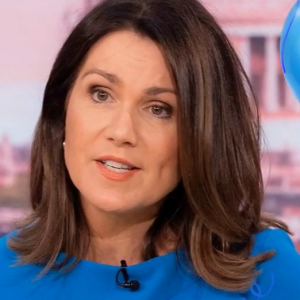The cobbled streets of Weatherfield have once again bid a poignant farewell to a beloved resident, leaving a gaping void in the heart of one of its most cherished families. In a recent, emotionally charged episode, Coronation Street orchestrated the departure of Aadi Alahan, a character who has grown up before our very eyes, as actor Adam Hussain concluded his impactful tenure on the iconic ITV soap. What began as a hopeful new chapter for Aadi, seeking self-discovery halfway across the world, quickly spiralled into a terrifying ordeal for his twin sister, Asha, exposing the profound depth of their bond and the enduring challenges faced by those left behind.
Adam Hussain, who took on the role of Aadi in 2020, had previously announced his decision to step away from the Street in April, setting the stage for Aadi’s ambitious plans to relocate to India. Viewers had witnessed Aadi’s quiet determination to forge his own path, often overshadowed by the more dramatic escapades of his sister and the well-meaning but sometimes overbearing presence of their father, Dev. His journey to India wasn’t merely a geographical move; it represented a deeper quest for independence, a chance for the young Alahan to truly find himself away from the familiar confines of Weatherfield and the familial expectations that often weighed heavily upon him. The prospect of his departure, while tinged with sadness, was understood as a natural progression for a young man eager to embrace new experiences.
However, in true Coronation Street fashion, the path to a peaceful farewell was anything but straightforward. Spoilers released in the week leading up to the episode tantalizingly hinted at a devastating turn of events: a horrific car crash, and a frantic Asha recognizing the mangled vehicle as Aadi’s. This pre-broadcast tease sent shockwaves through the fandom, preparing them for the worst, bracing themselves for the potential loss of a character who had endeared himself to millions over the years. The show masterfully played on these anxieties, building an almost unbearable crescendo of suspense before the actual events unfolded.

The episode began with an undercurrent of tension, even before the main drama ignited. Dev Alahan, ever the doting but sometimes distracted father, expressed his disappointment that Asha’s work shift at the bistro would prevent her from attending a planned goodbye breakfast for Aadi. What was meant to be a momentous, celebratory send-off for Aadi thus devolved into a somewhat muted, low-energy farewell. There were no grand pronouncements, no tearful embraces, just a quiet understanding and a shared, understated sadness. This seemingly minor detail would later prove to be a crucial catalyst for Asha’s spiralling distress, a missed opportunity for the emotional closure she desperately needed.
As Aadi prepared to embark on his life-altering journey, Asha found herself immersed in the routine of her job. It was there, amidst the clatter of the bistro, that her world violently shifted. The urgent call came, summoning her to the scene of a brutal road traffic accident. Rushing to the chaotic, flashing lights, the twisted metal, and the grim faces of emergency services, Asha’s heart plummeted. Amongst the wreckage, a horrifying recognition dawned upon her: the distinctive lines and colour of the vehicle were unmistakably Aadi’s car. A wave of ice-cold dread washed over her, the vibrant colours of the world draining into a terrifying monochrome. Her frantic, desperate pleas for information were met with the stoic silence of the first responders, a silence that amplified her deepest fears, confirming, in her mind, the unthinkable. In that harrowing moment, the spectre of losing her twin, her lifelong confidante, the other half of her shared history, became a chilling reality.
Just as the audience, along with Asha, braced for the inevitable, a familiar voice cut through the chaos. “Asha!” it called out, breaking the spell of terror. Turning, Asha saw him – Aadi, very much alive and well, standing behind her, a bewildered expression on his face. The sudden jolt of relief was almost as incapacitating as the fear itself. Dev quickly arrived on the scene, explaining the bizarre and thankfully non-fatal truth: Aadi’s car had been in the garage for an MOT and had been stolen. The near-tragedy was nothing more than a cruel twist of fate, a horrifying case of mistaken identity and an audacious theft. The collective sigh of relief, both on screen and in living rooms across the nation, was palpable.

Back in the sanctuary of their home, the echoes of the near-disaster continued to reverberate through Asha. Despite Aadi’s safe return, she remained visibly shaken, her hands trembling, her mind replaying the terrifying images of the crash. Aadi, ever the caring brother, sensed her distress and, perhaps for a fleeting moment, considered postponing his departure, offering to stay by her side. But Asha, in an act of misguided self-sacrifice and a desperate attempt to appear strong, assured him she was fine, urging him to stick to his plans. This insistence, despite her obvious fragility, stemmed from a deeper place of love and a desire not to hold him back, even if it meant suppressing her own trauma. As a final, tender gesture, Aadi left her his favourite hoodie, a comfort object she frequently borrowed, and asked her to send him a voice note later to confirm she was truly okay. With a final, quiet goodbye, Aadi Alahan walked away from the cobbles, leaving a silent, emotional chasm in his wake.
Asha’s ordeal, however, was far from over. The repressed terror of the car crash, coupled with the emotional weight of Aadi’s departure and her inability to properly grieve the separation, began to manifest itself. Later that day, while working at the bistro, she witnessed a heated argument between Brody Melis, a dubious associate with a history of trouble, and one of his shady friends. The confrontation, likely insignificant in isolation, became the final straw for Asha’s frayed nerves. Overwhelmed by pent-up stress, the near-loss of her brother, and her own feelings of vulnerability, she erupted, screaming at the men in a raw, uncontrolled outburst. Her supervisor, Sienna, witnessing the unprofessional display, immediately sent Asha home, later issuing a stern warning that any repeat incident while in uniform would result in a formal report. This public display of distress only added to Asha’s burgeoning sense of isolation and shame.
Seeking solace and perhaps an ear to listen, Asha later attempted to confide in her father, Dev, at the Rovers Return. The pub, often a place of shared confidences and emotional catharsis, failed her this time. Just as she began to tentatively open up, the ever-present Mary Taylor arrived, her well-meaning but often oblivious chatter effectively shutting down any chance of a meaningful conversation. The opportunity for Asha to unload her burdens was lost, leaving her feeling even more alone. Frustrated and overwhelmed, she turned to the only comfort she could find: alcohol, drowning her sorrows in a desperate attempt to numb the emotional pain.

It was in this state of vulnerable inebriation that DS Lisa Swain, a figure of authority but also of unexpected empathy, encountered Asha. Seeing her distressed and clearly inebriated, Swain, demonstrating a humanity often hidden beneath her professional demeanour, gently walked Asha home. In the quiet intimacy of that walk, away from the prying eyes of the pub and the distractions of her family, Swain offered Asha the space she desperately needed. Asha, finally able to unburden herself, poured out her raw feelings: the terror of the car crash, the crushing fear of losing Aadi, the gnawing guilt over their “low-energy” goodbye, the shame of her outburst at work, and the profound sense of abandonment now that her twin was truly gone. Swain listened patiently, offering not just a sympathetic ear but also practical advice, urging Asha to report the verbal abuse from the previous day to her manager, suggesting a constructive step towards regaining control.
Aadi Alahan’s departure marks a significant shift for the Alahan family, particularly for Asha. The twin dynamic, a constant source of support, conflict, and love, has been irrevocably altered. While Aadi embarks on his journey of self-discovery, Asha is left to navigate a challenging path of healing and self-reliance, grappling with the trauma of a near-loss and the emotional void left by her brother. Adam Hussain’s portrayal of Aadi brought a quiet strength and relatable innocence to the character, and he will undoubtedly be missed by viewers. His farewell storyline, though punctuated by a dramatic misdirection, ultimately served to deepen our understanding of the Alahan family’s intricate bonds and set the stage for Asha’s compelling future journey. As the dust settles on this heartbreaking farewell, Coronation Street once again proves its masterful ability to weave complex emotional narratives, ensuring that even in departure, the impact of its characters continues to resonate deeply within the fabric of the Street. We eagerly await to see how Asha finds her footing in a world without her twin, and whether Aadi will ever return to the familiar cobbles he now leaves behind.





